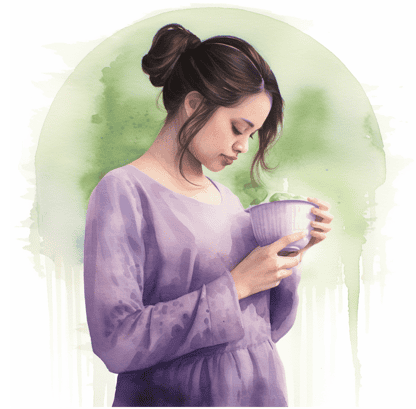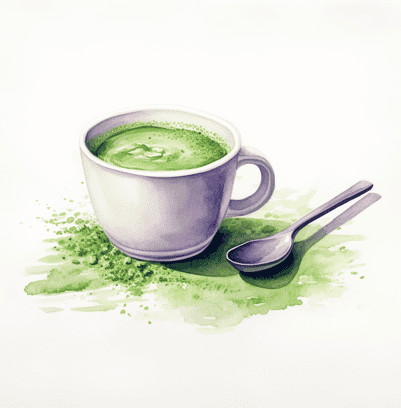
Can you drink matcha green tea while pregnant? Many expectant mothers ponder whether their favourite green brew might affect their skin or overall health during pregnancy. While matcha is packed with benefits, there’s a twist—too much could influence your caffeine levels. There are also concerns with the lead content in tea in general.
Hi, I’m Hazel
I gave up on skincare after years of issues with acne and sensitive skin.
But after going plant-based, my skin cleared up and even started to glow. Now I help women reveal their natural beauty with simple, delicious plant-based food.
I also used to be a nurse, and love nerding out on nutritional science (high-quality science, that is).

As usual, this post is based on the strongest nutritional evidence I could find with a focus on the simplest, most delicious foods
…because who has time to waste on actions that don’t work?
The quick version:
Yes, pregnant women can drink matcha green tea. However, it’s important to limit consumption to one cup per day due to caffeine content. Choose high-quality, low-lead matcha, preferably from Japan, to minimise potential risks.
Can You Drink Matcha While Pregnant?
Absolutely, expecting mothers can enjoy a cup of matcha during their pregnancy. But there are a few important considerations to keep in mind.
It’s crucial to ensure you’re choosing matcha from sources you trust to be low in lead. When it comes to matcha, particularly Japanese matcha known for its low lead levels, it should be safe to drink.

If you’re confident in the low lead content, you can enjoy matcha. Then keep in mind that the recommended limit is four cups before you reach the daily caffeine intake to prevent you from getting too much caffeine.
Matcha offers significant benefits of matcha such as high antioxidant content which can be particularly appealing during pregnancy. By choosing high-quality, low-lead matcha, you address primary concerns about contaminants while still enjoying the unique flavor and health benefits of this vibrant green tea.
Note: Please consult your healthcare provider for personalised guidance on consuming matcha green tea during pregnancy. Then you can ensure it aligns with your specific health needs and conditions.
The Risks of Caffeine and Lead During Pregnancy
During pregnancy, being mindful of what you consume is crucial for both your health and the health of your baby. Two significant concerns are high caffeine intake and lead exposure, which can have serious implications for fetal development.

Caffeine consumption during pregnancy should be monitored closely.
While a moderate amount, such as the caffeine found in a cup of coffee or less, is generally considered safe, high caffeine intake can lead to several side effects. These include increased heart rate and high blood pressure, which can subsequently reduce blood flow to the placenta and affect fetal development.
Studies have shown that excessive caffeine can also contribute to low birth weight and pregnancy loss (1, 2, 3).
Lead exposure is another critical concern for pregnant women.
Lead can be particularly dangerous as it may pass from a pregnant woman to her fetus. This potentially leads to kidney damage, impaired cognitive function, and developmental delays (4, 5).
It also interferes with the body’s ability to combat free radicals. This can cause cellular damage and impact the health of both the mother and the fetus.
Since tea leaves, particularly older ones, can accumulate lead from environmental contamination, choosing a tea source with less caffeine and low lead levels, like certain types of matcha, is advisable to minimise these risks.
By managing caffeine and avoiding high-risk lead sources, pregnant women can better protect their health and ensure safer fetal development.
Green Tea: A Safer Option?

Green tea and matcha both come from the Camellia sinensis tea plant, so green tea offers the same potential health benefits, if to a lesser degree. These include reducing oxidative stress and boosting your immune system,
Choosing between green tea and matcha during pregnancy involves understanding both the physical differences and potential contamination risks associated with each. While both come from the same plant, the form they take and their preparation methods significantly impact their safety profiles.
Regular green tea is typically made from mature leaves that are dried and steeped in hot water.
The key advantage here is that the leaves are not consumed directly, which reduces the risk of ingesting contaminants like lead.
Lead contamination in tea leaves can vary based on proximity to industrial areas and previous uses of leaded gasoline, which means that the soil where the tea grows might contain lead. Since green tea involves infusing water through the leaves and discarding them, much of the lead stays with the leaf rather than going into the water.
If you are unsure of the lead content of your green tea, then one cup a day should be your limit.
On the other hand, matcha green tea is a type of green tea that you eat.

It’s made by grinding young green tea leaves into a fine powder that is then whisked into hot water and consumed entirely. This means that if there are any contaminants like lead in the leaves, they are directly ingested.
Young leaves, such as those used for matcha, generally have lower concentrations of lead than older leaves; however, the fact that the whole leaf is consumed in powdered form can potentially increase the risk of lead exposure.
Factors Influencing Tea Safety
The safety of your matcha green tea largely depends on its origin. Opting for organic matcha is a smart choice as it’s generally free from heavy metals like lead, which can be absorbed by Camellia sinensis tea plants.
Also keep in mind that the vibrant green color of high-quality matcha not only reflects its rich nutrient content but also its freshness and minimal exposure to pollutants if properly sourced.
However, it’s crucial to choose matcha from reputable sources, ideally from regions known for low contamination levels, to minimise potential risks.
Caution with Other Teas
While exploring your tea options during pregnancy, it’s wise to be cautious with black tea and teas from older leaves. These teas are more likely to absorb higher amounts of lead from the environment compared to the younger leaves used for making matcha.
Even a cup of black tea should be avoided.
Unless you’re certain of their low lead content, it’s best to avoid these types of tea during pregnancy to minimise any potential health risks to you and your baby. This caution helps ensure that your pregnancy diet remains safe and beneficial.
Can you drink matcha green tea while pregnant?
Navigating what to drink during pregnancy doesn’t have to be complicated. With the right knowledge and precautions, you can continue to enjoy matcha while taking good care of your health and your baby’s well-being. Always consult your doctor when making changes to your diet, especially when considering herbal teas and other caffeinated beverages during this special time.
References
Most references below will link to the original peer-reviewed study itself. However, sometimes I will link to a video over at NutritionFacts.org instead, which is by far the single best resource of brutally transparent nutritional evidence you will ever see. Dr Greger tells a great story about the realities of the science and if I think you will benefit more from one of his videos, the link will take you there instead.
Happy nerding!
- Mannucci C, Attard E, Calapai F, et al. Coffee intake during pregnancy and neonatal low birth weight: data from a multicenter Italian cross sectional study. J Matern Fetal Neonatal Med. 2022;35(22):4365-4369. doi:10.1080/14767058.2020.1849120
- Li J, Zhao H, Song JM, Zhang J, Tang YL, Xin CM. A meta-analysis of risk of pregnancy loss and caffeine and coffee consumption during pregnancy. Int J Gynaecol Obstet. 2015;130(2):116-122. doi:10.1016/j.ijgo.2015.03.033
- Lamy S, Houivet E, Benichou J, Marret S, Thibaut F; Perinatal network of Upper-Normandy. Caffeine use during pregnancy: prevalence of use and newborn consequences in a cohort of French pregnant women. Eur Arch Psychiatry Clin Neurosci. 2021;271(5):941-950. doi:10.1007/s00406-020-01105-2
- Gardella C. Lead exposure in pregnancy: a review of the literature and argument for routine prenatal screening. Obstet Gynecol Surv. 2001;56(4):231-238. doi:10.1097/00006254-200104000-00024
- Hackley B, Katz-Jacobson A. Lead poisoning in pregnancy: a case study with implications for midwives. J Midwifery Womens Health. 2003;48(1):30-38. doi:10.1016/s1526-9523(02)00366-5
- Video: Lead Contamination of Tea at NutritionFacts.org